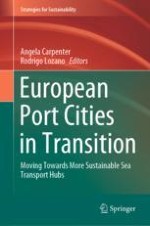2020 | OriginalPaper | Chapter
16. Integrated Port Cities: The Case of Hamburg
Authors : Michele Acciaro, Katharina Renken, Christopher Dirzka
Published in: European Port Cities in Transition
Publisher: Springer International Publishing
Activate our intelligent search to find suitable subject content or patents.
Select sections of text to find matching patents with Artificial Intelligence. powered by
Select sections of text to find additional relevant content using AI-assisted search. powered by
